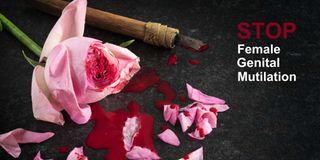Anti-FGM Board, Unicef join hands to assist 3,500 girls

Covid-19 has proven a big challenge to the welfare of girls in communities that continue to engage in retrogressive practices like FGM and early marriages.
What you need to know:
- Anti-FGM Board teamed up with the United Nations Children’s Fund (Unicef) to procure dignity kits for vulnerable girls in FGM-prone counties.
- Board chair Agnes Pareiyo, says the kit consists of a solar light, sanitary pads, bathing soap, bar soap, petroleum jelly, tissue paper, slippers, a T-shirt, piece of cloth and kanga.
- Ms Pareiyo lamented that the board’s campaign to end the vice was beset by challenges including medicalised FGM, secretly carried out on girls by medical personnel paid by the victims’ families.
The Anti-FGM Board recently dispatched assistance to 3,500 vulnerable girls at risk of female genital mutilation (FGM) drawn from 12 counties.
According to Anti-FGM Board chair Agnes Pareiyo, the kit consists of assorted items including a solar light, sanitary pads, bathing soap, bar soap, petroleum jelly, tissue paper, slippers, a T-shirt, piece of cloth and kanga.
The board teamed up with the United Nations Children’s Fund (Unicef) to procure the items.
“Unicef and the board have identified 7,000 girls aged between 10-14 and 10-17 vulnerable girls at risk of FGM. In the first phase of the program, we are launching 3,500 dignity kits to go directly to 12 selected counties,” said Ms Pareiyo.
Girls from Kisii, Migori, Wajir, Garissa, Kajiado, West Pokot, Marsabit, Isiolo, Narok, Laikipia, Tana River, and Samburu counties will benefit.
Big challenge
“The kits provide much need relief to the girls when the buying of the items is not given priority by their parents and guardians. Additionally, the girls will get mentorship, life skills and advice to maintain their self-esteem,” said the board boss.
Ms Pareiyo said Covid-19 had proven a big challenge to the welfare of girls in communities that continue to engage in retrogressive practices like FGM and early marriages.
“The Covid-19 pandemic poses great challenges to our country including the welfare of our girls who have been subjected to FGM due to the prolonged closure of schools,” said Ms Pareiyo.
She said the rite was especially harmful to girls as it usually marks the end of their education.
Teen pregnancies
“Girls are immediately married off once they are subjected to FGM. This hampers their education and progress in life. Most teen pregnancies are also due to FGM,” she said.
Ms Pareiyo lamented that the board’s campaign to end the vice was beset by challenges including medicalised FGM, secretly carried out on girls by medical personnel paid by the victims’ families.
“The campaign to end FGM is facing some challenges including medicalization of FGM, resistance to the campaign by some communities, cross-border practice of the rite, the reduced age at which girls are being cut, secrecy and unwillingness by witnesses to testify against perpetrators of FGM,” she said.
In the data captured by Kenya Demographic and Health Survey (KDHS) 2014, 46 per cent of women aged between 15 and 19 were circumcised at the ages of five to nine, compared to 17 per cent of women age between 45 and 49.
Accomplices in the crime
Ms Pareiyo, however, noted that the rite’s prevalence was slowly declining in the country.
“There has been a gradual decline in FGM among women aged 15 and 49, from 38 per cent in 1999, to 32 per cent in 2003, to 27 per cent in 2008 and 21 per cent recorded in the KDHS of 2014. There is, however, a high prevalence of FGM in some communities since it is deeply rooted in their culture,” she said.
While some national government administrators including chiefs and assistants are doing a commendable job of identifying and nabbing perpetrators of FGM, it is regrettable that some rogue chiefs are accomplices in the crime, she lamented.
Ms Pareiyo cited the case of Kuria, in Migori County, which was in the limelight recently following the broadcast of a video footage featuring girls who had undergone the cut being openly celebrated in some villages.
Openly celebrated
In the wake of the outcry over the brazen rite and celebrations, the government has since moved to crack down on the rite, suspending 10 chiefs and their assistants in the expansive region that borders Tanzania for supporting the practice.
“On Monday, we were in Kuria where 10 chiefs and their assistants have been interdicted for encouraging the practice. We call for similar drastic measures from the interior ministry to ensure that the presidential directive on elimination FGM is a reality,” she said.





